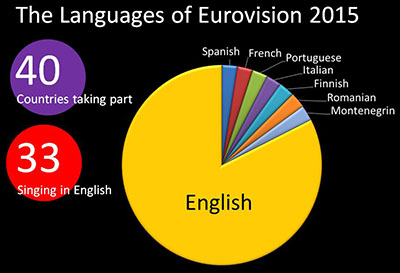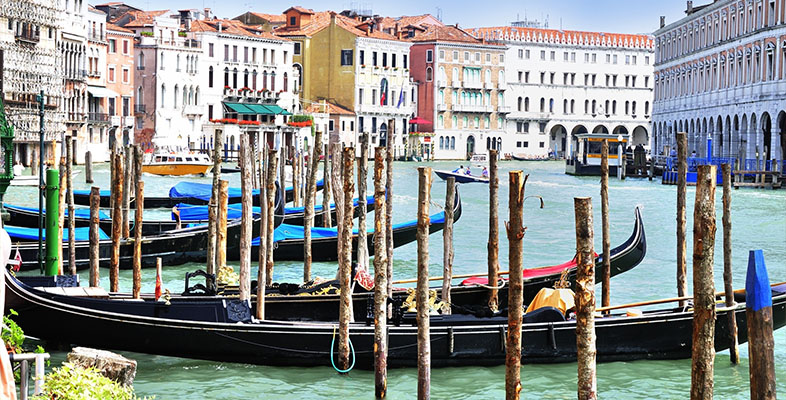 If you don't have many hopes for UK Eurovision entry you may like to know that at least it has an advantage: it's sung in English. Since the rules were changed in 1999 to allow countries to compete in any language, all winning songs bar one (Serbia in 2007) have been sung in the English language. Alas, the UK is far from being the only country singing in English: of the 40 songs that entered the competition this year, 33 are in English and one is sung in both English and Romanian. Only one song not in the English language (apart from the bilingual Romanian entry) has made it through the semi-finals to tomorrow's final: the Montenegro entry, sung in Montenegrin. Those two songs, together with the entries from Spain, France and Italy, will be the only five not sung entirely in English in the final this year.
If you don't have many hopes for UK Eurovision entry you may like to know that at least it has an advantage: it's sung in English. Since the rules were changed in 1999 to allow countries to compete in any language, all winning songs bar one (Serbia in 2007) have been sung in the English language. Alas, the UK is far from being the only country singing in English: of the 40 songs that entered the competition this year, 33 are in English and one is sung in both English and Romanian. Only one song not in the English language (apart from the bilingual Romanian entry) has made it through the semi-finals to tomorrow's final: the Montenegro entry, sung in Montenegrin. Those two songs, together with the entries from Spain, France and Italy, will be the only five not sung entirely in English in the final this year.
The Eurovision rules about song language have changed through the years. At first there was no language policy, but most countries entered songs in their own official language(s) anyway. Between 1966 and 1972 a restriction to sing in one of the official languages of the country was imposed, but this changed in 1973 and for the next 4 contests countries had the freedom to sing in any language (that's why ABBA were able to sing Waterloo in English). From 1977 until 1999 the restriction to use only official languages applied again.
During the times when the restriction applied, some countries entered songs in languages other than the main language of the country: France has competed with songs in Corsican, Breton and even Haitian Creole; Italy entered a song in Neapolitan in 1991, and in 1972 even Ireland eschewed English in favour of an Irish language song. The UK has never entered a song in Welsh, Scot or Scottish Gaelic, however. There have been songs in made-up languages, and we must not forget great Eurovision classics using titles such as La La La, Ding-a-dong, Boom Bang-a-bang, A-ba-ni-bi, and Diggi-Doo Diggi-Ley.
France, Italy, Spain and Portugal have always sung in one of their official languages, sometimes combined with a few words in English. Even partial use of the English language in their entries has gathered criticism: there were complaints in France when their song "Divine" included verses in English in 2008 and last year the Spanish Royal Academy of Language complained about the use of English in the chorus of the Spanish entry.
It’s not only the songs that are dominated by English. Another Eurovision classic is in decline: you are unlikely to hear many "douze points" being awarded as, although French remains an official voting language in the contest, most national spokespeople choose to deliver their votes in English. Speaking of votes, there surely will be talk of bloc voting and political alliances as countries deliver their points. There’s no denying that neighbours often vote for their fellow neighbouring countries, but is this politically motivated? It seems to me that countries often vote for songs that sound close to their own musical tastes. So if a Balkan country votes for another, ask yourself if the song / look / language have much in common with the country that is awarding votes for them.
British People often say the UK is shunned by other countries because of Euro-politics, but there is no hard evidence to prove it. Maybe viewers should reflect on how much effort the BBC puts into the British entry. The last time a big effort was made was in 2009, when Andrew Lloyd-Webber was enlisted to write the song and find a suitable singer. The song, “It’s My Time”, came fifth in the contest, the last time the UK has bothered the top 10. In the last few years the UK has sent either “veteran” (ahem) singers like Engelbert Humperdinck or Bonnie Tyler or unknown inexperienced newcomers. This year, the song selected was announced in 15 programme available on the red button / iPlayer. Compare the UK effort with that of Sweden, where they host the Melodiefestivalen, a huge contest to select their representative, and you’ll get a feeling that the UK gets what it gives.
Despite the evidence that Eurovision is becoming a monolingual event, it remains a multicultural event. It really is hard to tell sometimes whether the costumes, songs and choreographies are meant to represent the best or the worst of the country. Diversity, gender politics, and human rights have become main issues in the contest. Last year’s clearly audible booing of the Russian entry because of their homophobic policies and Ukraine intervention was evidence of this, even though you couldn’t help feeling sorry for the 17-year-old twins who represented their country and whose performance had nothing to do with the booing. This year, anti-booing technology will be used to prevent similar occurrences.
Also new this year is the use of sign language to make the competition more inclusive. And to celebrate the 60th anniversary of the contest, Australia have been invited for a one-off entry into the competition. Alas, their representative Guy Sebastian will not be singing in any of the 27 aboriginal languages of Australia.
As modern foreign language teachers in the UK know all too well, recruiting students is a perpetual fight against the all-too-common question: “Why should I learn another language when everyone else speaks English?” In the case of Eurovision it does indeed feel like everyone else does speak English. There's every chance that a song in English will win the final tomorrow, meaning that out of 60 Eurovision contests, half of them will have been won by songs in the English language. It seems that English is the language of pop after all.



Rate and Review
Rate this article
Review this article
Log into OpenLearn to leave reviews and join in the conversation.
Article reviews
greetings and muchas gracias Fernando por el articulo.
adriana
A quick introduction to the history of the Catalan language can be found at http://www.theguardian.com/world/2012/nov/22/catalan-language-survived